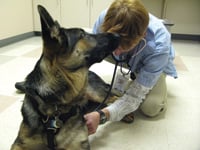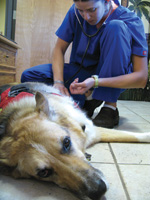 During our travels we’ve seen critters ranging from iguanas to monkeys enjoying life on the road with their humans. If you’re considering full-time RVing but aren’t sure how your pets will cope with this significant change, rest assured that most animals quickly adapt to the lifestyle. After all, domestic pets don’t care where they live, just who they live with—and your pets want that person to be you. Once you hit the road together it’s not hard to find excellent veterinarians as long as you know where to look. This month I want to share what we’ve learned about caring for the medical needs of companion animals on the open road.
During our travels we’ve seen critters ranging from iguanas to monkeys enjoying life on the road with their humans. If you’re considering full-time RVing but aren’t sure how your pets will cope with this significant change, rest assured that most animals quickly adapt to the lifestyle. After all, domestic pets don’t care where they live, just who they live with—and your pets want that person to be you. Once you hit the road together it’s not hard to find excellent veterinarians as long as you know where to look. This month I want to share what we’ve learned about caring for the medical needs of companion animals on the open road.
Before I get started, please remember that if you ever suspect your animal needs to receive veterinary care, go with your instinct and get help quickly. Animals are excellent at hiding their pain and far too often we humans ignore signs of illness. Should you find yourself wondering if your animal’s current state of health requires an emergency visit, review this Cornell University College of Veterinary Medicine article to know when it’s time to get help: http://bit.ly/firstaidforpets.
First, Be Prepared
We hit the road six months after our dog Jerry was diagnosed with terminal cancer and underwent a front limb amputation. Naturally we were concerned that finding high-quality veterinary care would be difficult, but we didn’t let that stop us from living our dream of traveling with our best friend. Everything worked out as we had hoped and today we travel with our four-year old German Shepherd Wyatt, who has also needed a variety of veterinary care during our travels.
It hasn’t been too difficult to deal with Wyatt’s and Jerry’s health needs because we keep detailed medical history files in the RV. Our records include milestones such as vaccination histories, chronic conditions, prescriptions and test results from x-rays to ultrasounds (a good vet can provide electronic files of these scans). Although some smartphone apps can help manage a pet’s health history, no apps that I know of enable you to import scanned documents into the program. I find it’s just easier to keep hard copies but if you’re trying to minimize paper usage, there’s always document storage devices such as “Protect My Papers” (protectmypapers.com), which helps you scan and organize your paper files into one portable USB drive.
Choosing a General Practice Veterinarian Through the years we’ve learned more than we ever wanted to know about finding quality vets in unfamiliar towns. The main thing we’ve discovered is that as full-time RVers, one of the greatest advantages to this lifestyle is the ability to quickly relocate to find the best medical professionals for our needs. By asking friends and family for veterinary referrals, we can plan our route accordingly. For example, when our dog Jerry’s cancer returned, we had the luxury of seeking treatment in either Los Angeles or Santa Fe. For us it was a no-brainer; if we were going to battle cancer again, we would do it at a highly rated clinic in beautiful northern New Mexico.
Through the years we’ve learned more than we ever wanted to know about finding quality vets in unfamiliar towns. The main thing we’ve discovered is that as full-time RVers, one of the greatest advantages to this lifestyle is the ability to quickly relocate to find the best medical professionals for our needs. By asking friends and family for veterinary referrals, we can plan our route accordingly. For example, when our dog Jerry’s cancer returned, we had the luxury of seeking treatment in either Los Angeles or Santa Fe. For us it was a no-brainer; if we were going to battle cancer again, we would do it at a highly rated clinic in beautiful northern New Mexico.
Referrals from friends and family who love animals as much as you do isn’t the only way to find quality care. If you’re in an unfamiliar location, remember that even in an emergency you can quickly turn to websites such as Yelp.com and the membership-based AngiesList.com, both of which are fantastic resources to find nearby clinics and read firsthand reviews by happy (and unhappy) clients. You’ll want to choose clinics that are AAHA-accredited, which means they adhere to the highest-quality standards set by the American Animal Hospital Association.
Last year we had to utilize the power of Yelp.com when one morning our dog Wyatt woke up with a golf ball-sized lump on his rear end. Yelp helped us find the closest, highly rated AAHA practice near our RV park in Georgia. We immediately headed to a clinic less than three miles away that lived up to glowing customer reviews. Although the on-duty vet couldn’t diagnose the troublesome lump, she happily referred us to a specialty clinic on our route.
Getting Specialty Care
At some point nearly every animal will require the services of a specialty clinic. From veterinary oncology to dermatology and acupuncture, these clinics offer the services of board-certified veterinary specialists who can diagnose and treat illnesses that are beyond the scope of family veterinarians. You’ll pay more upfront to diagnose and treat the issue, but in the long run you’ll save money by resolving the problem much faster than a general practice vet could, if at all.
Should you find yourself in need of a specialist, you may want to consider visiting a veterinary school teaching hospital. Veterinary teaching hospitals are located around the country (a list of AAHA-accredited institutions is located at http://bit.ly/AAHAvetschools). Teaching hospitals are a great resource for frugal-minded RVers like us. The staff at these schools are motivated by research breakthroughs, not profit, which means prices are often far more competitive than those found at private practices. Veterinary teaching hospitals also have the newest, cutting-edge technologies and therapies as well as young, fresh minds working alongside the nation’s most brilliant researchers. Some hospitals require a referral before providing treatment so always verify hospital admission policies beforehand.
When Wyatt needed a specialist during his “butt-lump” incident, we headed straight to Texas A&M University in College Station, Texas. It has one of the best hospitals in the country and is conveniently located near our Escapees RV Club home base of Livingston, Texas. Wyatt was treated for over a month by Texas A&M doctors while we camped out in Livingston. When it was over, we obtained complete files of his treatments and happily hit the road once again.
Seeing America through the eyes of our dogs has been one of the greatest experiences we could have imagined. Life on the road isn’t always easy but when things get tough, having an exuberant animal around reminds Jim and me to stop sweating the small stuff. If you’re wondering what you’ll do with your pets should you choose to start full-timing, I think you’ll find that the benefits of having critters around far outweigh the minor inconvenience of occasionally planning your route to coincide with their veterinary care.
Rene Agredano and her husband, Jim Nelson, have been full-time RVing with dogs since 2007. They currently travel with a three-legged, 80-pound German shepherd named Wyatt, appropriately nicknamed “The Sheriff.” The trio’s adventures are chronicled at LiveWorkDream.com. Rene also writes “The Full-Timing Nomad blog” at rvlife.com.

[…] – Veterinarian care: We haven’t had to use a vet on the road, but our Rand McNally GPS lists veterinarians right on the map. This is a good article for RV’ers needing care for their pets while on the road: http://rvlife.com/when-a-pet-needs-a-vet/ […]